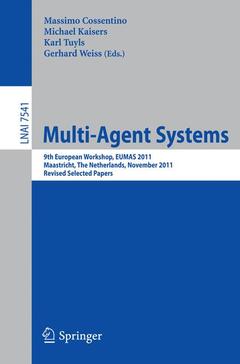Description
Multi-Agent Systems, 2012
9th European Workshop, EUMAS 2011, Maastricht, The Netherlands, November 14-15, 2011. Revised Selected Papers
Lecture Notes in Artificial Intelligence Series
Coordinators: Cossentino Massimo, Kaisers Michael, Tuyls Karl, Weiss Gerhard
Language: English
Subjects for Multi-Agent Systems:
259 p. · 15.5x23.5 cm · Paperback
Description
/li>Contents
/li>Comment
/li>
Reinforcement Learning Transfer Using a Sparse Coded Inter-task Mapping.- Game Theory for Security: An Important Challenge for Multiagent Systems Local Coordination in Online Distributed Constraint Optimization Problems.- Improving Diagnosis Agents with Hybrid Hypotheses Confirmation Reasoning Techniques.- Towards a Design Process for Modeling MAS Organizations.- Argumentation Strategies for Task Delegation.- Using OWL 2 DL for Expressing ACL Content and Semantics.- Self-adaptive Complex Systems.- Argumentation Semantics for Agents.- Multi-agent Learning and the Reinforcement Gradient.- A Methodology for the Generation of Multi-agent Argumentation.- Dialogue Scenarios.- What Are Models for.- QueryPOMDP: POMDP-Based Communication in Multiagent Systems.- A Multi-agent Based Governance of Machine-to-Machine Systems.- A Proposal of Process Fragment Definition and Documentation.- Recognizing Internal States of Other Agents to Anticipate and Coordinate Interactions.
Up to date results
Fast track conference proceedings
State of the art research




